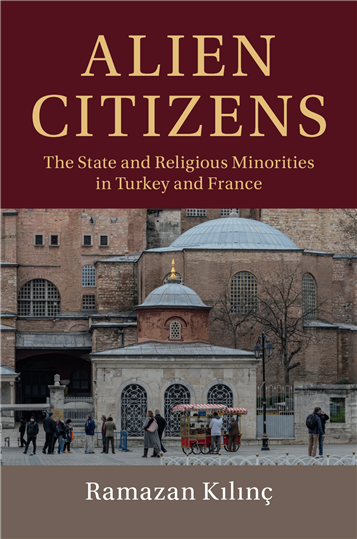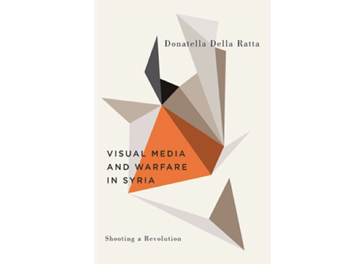Ramazan Kılınç, Alien Citizens: The State and Religious Minorities in Turkey and France (Cambridge University Press, 2020).
Jadaliyya (J): What made you write this book?
Ramazan Kılınç (RK): When I started my PhD in 2003 at Arizona State University, two years after 9/11, there was rising Islamophobia in the West, especially in Europe. I wondered about the policy implications for Muslim minorities in European countries. When I compared the European state attitudes toward religious minorities, I found that France had the most discriminatory policies in the 2000s. One dominant reason for this was that France’s far right had been able to utilize the rising Islamophobia to execute its anti-Muslim policy agendas.
While this was happening in France, the Turkish parliament passed reformist laws around the status of Christian minorities in the 2000s—part of the conditions of EU membership. Turkey, at the time, was governed by Islamists who were also passing reforms to liberalize the Turkish system, limit the power of the military, and survive within that system. Christian minorities thus benefited from the reforms that helped Turkey start membership negotiations with the European Union.
As a comparative politics scholar, these two experiences intrigued me and pushed me to study the interaction of international and domestic level factors in producing state policies toward religious minorities.
J: What particular topics, issues, and literatures does the book address?
RK: Using parliamentary proceedings, court decisions, newspaper archives, and interviews with government officials, politicians, and community leaders in Istanbul and Paris, Alien Citizens examines how the international context interacted with domestic politics to produce state policies toward religious minorities in Turkey and France in the 2000s.
Comparing Christians in Turkey and Muslims in France, the book argues that policy change toward minorities becomes possible when strong domestic actors find a proper international context to execute their policy agendas. The Turkish Islamists used the European Union to transform Turkish politics and thus bring a reformist moment for Christians in the 2000s. The far right in France utilized the rise of Islamophobia in Europe to adopt restrictive policies toward Muslims.
I hope my book offers a new perspective to literature, namely how international and domestic politics combined can explain state policies toward religion. While other scholars have compared Turkey and France on their religious policies, policies toward religious minorities have been understudied. The book discusses how the framework developed in the study can be used to address other state policies, such as those toward the Jewish community in Turkey, and sects in France.
The book also contributes to democratization and authoritarianism literature by showing the influence of these processes on minorities. Turkish democratization in the 2000s created more space for Christians, while its turn toward authoritarianism stalled the reform process.
J: How does this book connect to and/or depart from your previous work?
RK: This book is in dialogue with my previous work in many regards. In a recent co-authored book with Carolyn Warner, Christopher Hale, and Adam Cohen, Generating Generosity in Catholicism and Islam: Beliefs, Institutions and Public Goods Provision (Cambridge University Press, 2018), we examined how religions, in general, and Catholicism and Islam, in particular, contribute to public goods provision. This book also included an analysis of the Christian minority in Turkey and the Muslim minority in France. Alien Citizens continued comparisons of these two groups in a different issue area.
In my other research, I addressed the relationship between religion, secularism, and democracy in Turkey with a framework that takes domestic-international interactions seriously. I explored the impact of Islamic actors on regime change by examining their interactions with the international context, domestic socio-structural factors, and political institutions. My 2014 article published in Political Science Quarterly (2014) focuses on the complicated relationship between Islam, secularism, and democratic consolidation in Turkey, focusing on Turkey’s relations with Europe. In another article, published in Uluslararası İlişkiler/International Relations (2016), I examined the conditions under which domestic ideological shifts produce ideology-based foreign policy. Alien Citizens shifted the framework of domestic-international interactions to the issue of state policies toward religious minorities.
J: Who do you hope will read this book, and what sort of impact would you like it to have?
RK: My motivation to write this book was mostly theoretical: to examine domestic-international interactions in explaining state policies toward religious minorities. To my knowledge, my book is the first study that does this. I expect that scholars working on religious minorities can expand this theoretical genre and use the framework in other contexts.
However, with this book, I also wanted to reach a broader audience. I did not use academic jargon for my book and so I hope it engages easily with public debates. I would like my book to make an impact on two grounds.
First, I would like the book to facilitate a dialogue on religious freedoms globally. Although there has been an increased awareness of religious freedoms recently, we have seen little interaction across different themes and groups in public discourses. Those who complain about rising Islamophobia in the West are less willing to talk about Christian minorities’ status in Muslim-majority countries. Those who complain about Christians’ problems in the Muslim world are less willing to address Islamophobia in the West. I hope that my book can facilitate a dialogue between these two groups and make them understand that religious freedoms are for all.
Second, I would like the book to increase knowledge of religious minorities and create awareness on minority rights. In the wake of the global rise of populism, the protection of minorities has become a prominent human rights issue. Populist movements usually put a hierarchy between the majority population and the minorities, with the latter emerging as one of the first victims. Supremacism is inherent in populist movements, and vulnerable people need more protection than ever. The status of minorities is a good measure of a pluralist democracy. Pluralist democracy requires all citizens to be equal. When democracy starts to shatter, minority rights are usually the first to give away.
J: What other projects are you working on now?
RK: I am working on a new manuscript, tentatively titled Two Tales of Islamism: The Rise and Fall of Muslim Democracy in Turkey. In the wake of the Arab Spring in 2012, many commentators, politicians, and scholars suggested Turkey as a model to the Arab world for finding the elusive formula that creates a Muslim democracy. Within a few years, Turkish politics took an authoritarian turn that limited civil and political liberties and embraced Islamist populism, falling behind some of the Arab Spring countries it was supposed to lead. This book manuscript aims to analyze the rise and fall of Turkey’s Muslim democracy in the 2000s and 2010s. By doing so, it draws conclusions about religion, democracy, and authoritarianism in the Muslim world.
J: Based on your book’s framework, how do you evaluate the current status of Christians in Turkey and Muslims in France?
RK: In Turkey, the conditions that produced the reformist moment between 2000 and 2010 radically changed in the 2010s. In contrast to many expectations, the Justice and Development Party (AKP, Adalet ve Kalkınma Partisi) government reversed its liberal policies and took an authoritarian path. The changing international environment enabled the AKP government to gear toward an authoritarian direction. Turkey’s Islamists, encouraged by their increased political power, calculated that they would gain a leadership role in the Middle East in the wake of the Arab uprisings, which they thought would bring Islamists into power in several Arab countries. As a result, they implemented populist-Islamist policies that eventually brought Turkey into a cycle of authoritarianism. The new international and domestic environment negatively influenced the status of Christian minorities, and the freedoms they had gained in the previous decade became under threat. Rising populist Islamism made non-Muslim minorities a target at the discursive and policy levels.
In France, the conditions that produced anti-Muslim policies between 2000 and 2010 did not change in the 2010s. With the rise of new extremist movements in the 2010s, Islamophobia continued to gain ground and the radical right grew even more potent. The leader of the National Front (FN, Front National), Marine Le Pen, became a front runner in the 2017 presidential elections. However, as opposed to the early 2000s when the center-right and center-left parties shifted toward an anti-immigrant stance to compete with the gradually nationalistic public, Emmanuel Macron, who defended a pro-immigrant and pro-EU stance, won the run-off elections. Nonetheless, Marine Le Pen won one third of the votes in the election. This result indicated the growth of an Islamophobic and anti-immigrant social base in France. All in all, both international and domestic factors have not dictated a rapid change in policies toward Muslims in France, and anti-Muslim policies may well continue for the foreseeable future.
Excerpt from the book (from Chapter 1: Rethinking State Policies toward Religious Minorities)
On May 21, 1903, as an act of gesture, the Ottoman Sultan Abdulhamid II joined the Greek Orthodox Patriarch Joachim III to celebrate the grand opening of the Büyükada Greek Orphanage, which served to the Greek orphans of both late Ottoman Empire and modern Turkey until 1964. When Turkey had a tension with Greece over Cyprus in 1964, the state’s General Directorate of Foundations (GDF, Vakıflar Genel Müdürlüğü) closed down the 20,000-square-meter wooden historic orphanage, which is located in a touristic island in the Sea of Marmara. The GDF did not repair the building since then and left it to destitution without any restoration. In the 1990s, the Greek Orthodox Patriarchate started a legal process against the Turkish state to register the ownership of the property under its name. The Turkish state denied the claim and argued that the GDF had the right to seize the property because it had not fulfilled its original function for more than ten years. When the Council of State, the supreme administrative court in Turkey, dismissed the Patriarchate’s claim in 2003, the case was carried to the European Court of Human Rights (ECHR). In 2010, the ECHR ruled in favor of the Greek Orthodox Patriarchate and transferred the ownership of the property to the Patriarchate.
In October 1989, Leila and Fatima Achaboun and their cousin Samira Saidani were expelled from Gabriel-Havez High School in Creil, a suburb outside Paris, for wearing headscarves on the school premises. The school principle, Eugene Chenière, claimed that he expelled the girls to implement the constitutional principle of secularism. Their expulsion drew extensive media attention, but very few supported the girls’ dismissal from school. The students returned to the school after the Council of State, the highest administrative court in France, decreed that the principal overstepped his authority. In its decision, the Council stated that the school could dismiss the girls only if they disrupted the order at school. To the court, wearing a headscarf in itself was not incompatible with the principle of secularism. This ruling would set the precedent for headscarf cases for the next fifteen years until the passage of a new law in 2004, which banned wearing of ostentatious religious symbols at public schools.
The story of the Büyükada Greek Orphanage is just one of many cases in which the Turkish government discriminated the Christian minority. This case illustrates the traumatic consequences of Turkey’s nation-building process for minorities. The official Turkish national discourse, based on a vision of a homogenous society defined by secularism and nationalism, made life difficult for minorities. In France, the story of the three Muslim girls at Gabriel-Havez High School is one of many cases in which the French courts protected Muslims’ religious freedoms when their rights were violated. Despite its unfriendly stance to religion as compared to other European countries, French secularism provided religious minorities with religious freedom, including students’ manifestation of religious symbols at schools.
However, by early 2000s, state policies toward religious minorities took a different trajectory in both Turkey and France. Turkey implemented new reforms that expanded the rights of religious minorities between 2000 and 2010 while France passed new laws that restricted religious freedoms for Muslims. International context played a significant role in these policy changes in both countries. While Turkey implemented new laws under the pressure of its European Union (EU) membership bid, France enacted new restrictions within the context of the rising Islamophobia in Europe in the wake of the September 11th terrorist attacks. These developments raise a significant question: How does international context influence state policies toward religious minorities? To answer the question, I examine the shifting state policies toward the Christian minority in Turkey and the Muslim minority in France between 2000 and 2010.
Scholars have explained state policies toward religious minorities by referring several factors including modernization process that undermined the power of the majority religion, historical legacies shaped in extended periods of time, competition over ideology, and strategic interaction among religious and political actors. Although these approaches provide valuable insights to explain the Turkish and French cases, they cannot account for the importance of international context that played a crucial role in the passing of new regulations in both countries. I argue that given structured relationships among sets of domestic groups competing over different policies, the presence of an international context that can favor particular groups over others, shifts the domestic balance of power, and makes some policies more likely to be implemented than others. The adoption of new policies depends on the availability of strong domestic actors who would benefit from international context and support the reforms due to either their material interests or normative commitments. International environment structures domestic politics through actors that mediate between external factors and domestic policies.
The reforms in Turkey became possible because stronger domestic actors, who would benefit from the reforms required to join the EU, emerged. The repressive political environment dominated by the military in the late 1990s left no option for Islamic actors with relatively large social bases but to devise strategies through which they could enhance political space at the expense of the authoritarian bureaucracy. They utilized Turkey’s relations with the EU and implemented the reforms to decrease the power of the military in Turkish politics. The government instituted religious rights for Christians as part of its democratizing agenda that would bring Turkey closer to the EU. Liberal groups, social democrats, and some Islamic groups contributed to this outcome by justifying pluralism through their civil society activism. In short, the international norms on religious freedoms diffused into the Turkish political system only after stronger domestic actors facilitated their adoption, either instrumentally or normatively.
Similarly, the restrictive policies toward Muslims in France were an outcome of the interaction of international context and domestic politics. The proponents of the restrictive policies in France utilized the rising Islamophobia in the wake of the September 11th terrorist attacks in 2001. Due to the rise of anti-Muslim sentiments globally, the proponents of the headscarf ban were able to portray wearing headscarves as a symbol of anti-republicanism and anti-secularism in France. By doing so, it became easier for them to engender strong popular support for their policy agendas. The rise of the far right in France led centrist parties to embrace the anti-Muslim rhetoric. As a result, a social coalition emerged to pass the ban in the parliament.
In the rest of this chapter, I first present the research puzzle with a brief background on Christians in Turkey and Muslims in France. Then, I review the previous explanations of religious freedoms, identifying their strengths and weaknesses. Next, I provide my explanation that combines international context and domestic politics. I introduce strategic and normative mechanisms that connects international context to domestic politics. Finally, I discuss the methods of analysis through which I demonstrate this argument. I explain my case selection, basic concepts, variables, and their measurements. I present the methodologies of comparative case studies and process-tracing with the justifications of why I choose them in my analysis.











